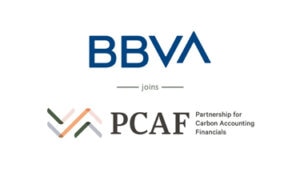BBVA is the first Spanish bank to join PCAF (Partnership for Carbon Accounting Financials)
BBVA reinforces its commitment to reducing the risks of climate change and joins PCAF (Partnership for Carbon Accounting Financials), an alliance that enables financial institutions to assess and disclose the greenhouse gas (GHG) emissions of loans and investments.

BBVA is the first and only Spanish bank to commit to PCAF´s measurement of financed emissions. The Partnership for Carbon Accounting Financials is a global partnership of financial institutions that work together to develop and implement a harmonized approach to assess and disclose the GHG emissions associated with their loans and investments. With more than 120 banks and investors from five continents already participating, this initiative, which was launched globally in September 2019, is expanding rapidly in North America, Latin America, Europe, Africa, and Asia Pacific. The total financial assets of all PCAF members currently total more than $39 trillion.
A core team of 16 financial institutions developed the Global (GHG) Accounting and Reporting Standard for the Financial Industry (“the Standard”), which aims to harmonize the accounting of greenhouse gas emissions and which was launched in November 2020. Measuring financed emissions with the Standard is a critical step for financial institutions to assess the transition risks associated with climate change, set objectives in line with the Paris Agreement, and develop effective strategies to decarbonize the economy.
Ricardo Laiseca, Head of BBVA´s Global Sustainability Office explained that: “Joining PCAF is very important in order to build a methodology that supports the efforts of global financial institutions to identify and measure the risks of climate change.”
“We are pleased to welcome BBVA and its commitment to measure and disclose its financed emissions using the PCAF Standard", said Giel Linthorst, Executive Director of PCAF. “Measuring financed emissions using PCAF will be a fundamental step for BBVA to achieve its goal of zero net emissions by 2050.
As the global financial industry adjusts to climate change´s effects, shareholders, regulators, investors and stakeholders demand a more proactive role in supporting solutions alongside governments and civil society. This is a great opportunity for financial institutions as high capital financing is necessary for this transition towards a low-carbon economy.
BBVA has long been committed to working towards controlling and reducing emissions (its own and those of its clients or investments). The institution is one of the founding members of the Net-Zero Banking Alliance (NZBA), in which banks ensure that all their credit and investment portfolios are neutral in net emissions of greenhouse gases by 2050. BBVA Chairman, Carlos Torres Vila, recently confirmed this at the last General Shareholders' Meeting.

BBVA also announced that it will stop financing coal-phase-out related companies by 2030 in developed countries, and in the rest of its footprint´s countries by 2040. This decision, which is included in the updated Environmental and Social Framework, is in line with the Intergovernmental Panel on Climate Change’s (IPCC) proposal, which aims to limit the rise in temperatures to a maximum of 1.5ºC.
BBVA is the most sustainable bank in Europe and second in the world, according to the Dow Jones Sustainability Index.